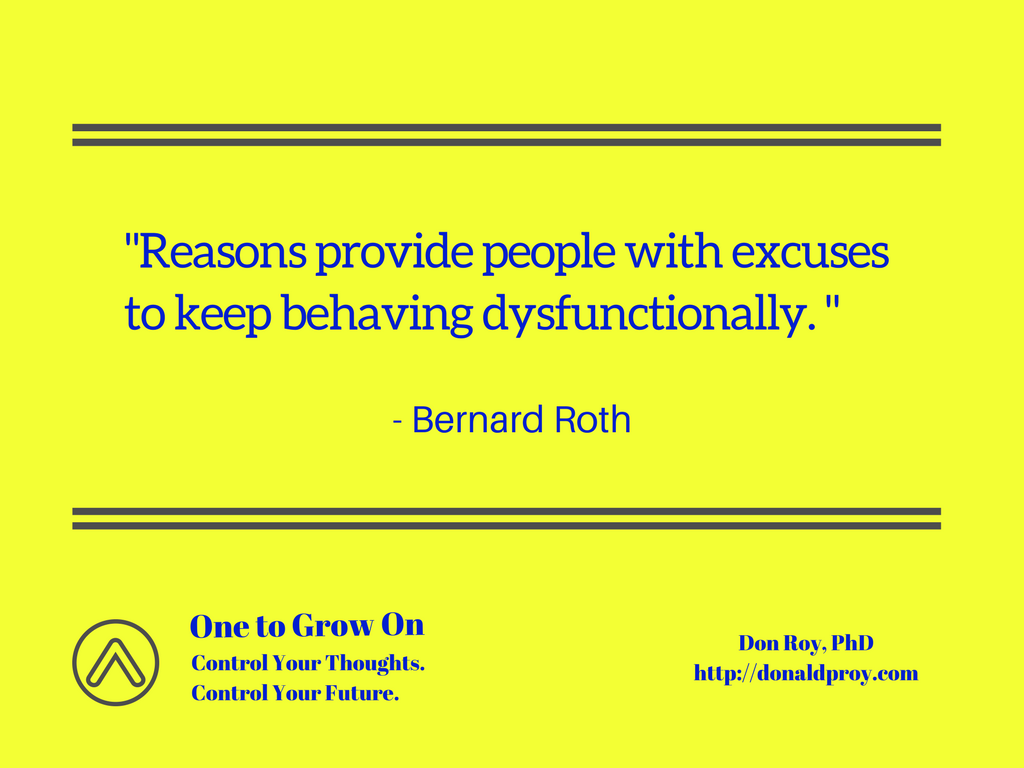We are masters of rationalization any time we do not attain a goal, fail to do something we should have done, or otherwise fall short. We can offer up seemingly legitimate reasons for failure. Perfecting this technique over time means we can absolve ourselves whenever it is convenient to do it. This exercise may shield us from being accountable for our missteps, but in the end it is little more than a fabrication of excuses that cloud the truth—we messed up.
The practice of offering reasons for failure that are nothing more than excuses wrapped in logic (or purported logic) is a shortcoming brought to the forefront in a book I am reading. Bernard Roth, a professor at Stanford’s Hasso Plattner Institute of Design, raises the reasons-as-excuses issue in The Achievement Habit: Stop Wishing, Start Doing, and Take Command of Your Life (HaperCollins, 2015). Would it surprise you that in a book about achievement the author says we must stop with the reasons (excuses) for our behavior?
The Reasons We Reason
Talk about change—I have years of experience as a “reasoner” that will be for naught if I buy into Roth’s view that the reasons have to go! I see his point and also see how rationalizing our behavior, especially when it contributes to falling short of desired outcomes, is a threat to growth. So, why do we allow reasoning to justify our behavior?
- Shifts focus to external factors. It is convenient to point at forces beyond our control as reasons for our failures. The economy, the weather, competition, workload (feel free to add some of your favorites here) could interfere with goal achievement. But, are they really the reasons we fail? One “reason” I need to remove from my library is “I’m too busy.” It is an excused dressed as a reason. What “I’m too busy” usually means is I am not good at time management or I need to become more selective in the projects I agree to take on.
- Avoids need to confront weaknesses. Reasons we do not achieve serve as a buffer from an uncomfortable conversation we must have with ourselves. Weaknesses limit our growth. We must be able to acknowledge their existence and resolve to negate (if not overcome) them. Admitting weaknesses can damage our pride, but pretending they do not exist potentially does far more harm to our personal brand.
- Preserves image. Every person has flaws, but we usually do not leverage them as part of our brand. We position ourselves on positive attributes possessed. When we offer reasons for failure or lack of success, we shift blame for failure away from our own brand. This deflection preserves the image others hold about us. However, be mindful that regularly citing reasons for failure could have the unintended effect of projecting an image that you always make excuses when things do not go your way.
Be Unreasonable
Bernard Roth is on to something when he says reasons are provide us with excuses to behave dysfunctionally. Too often, we want to use a pass for our actions rather than reflect on what we could do create better outcomes for ourselves. This week, I am going to put an emphasis on being “unreasonable.” Don’t worry, I am not planning to be unreasonable in my opinions and actions. My goal is to cut out leaning on the reasons for falling short that do not really explain my shortcomings.


